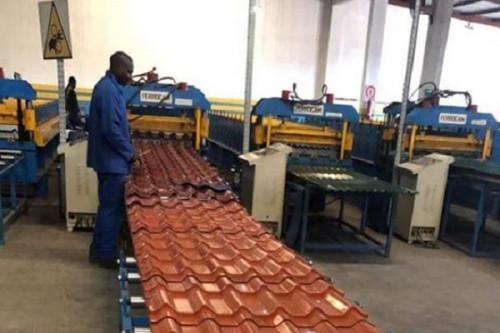
Cameroon: Factory gate price index rose by 3.8% YoY in Q2-2021, highest increase since Q3-2019

(Business in Cameroon) - Between April and June 2021, the factory gate price index of industrial goods rose significantly in Cameroon. This is revealed by the National Institute of Statistics (INS) in its Q2-2021 producer price index report published on November 12, 2021. According to the report, the index rose by 3.8% year to year, becoming the highest recorded since Q3-2019.
For INS analysts, this is mainly due to increased production costs in machinery and equipment manufacturing (7.5%), motor vehicle manufacturing (6.2%), and especially in metalworking (with 11.3%, almost doubling the average rise in production costs in the Cameroonian industrial sector) industries.
"In the second quarter of 2021, there was a sharp increase in producer prices (11.3% year-on-year) in the metalworking industry. This increase affected retailing prices with the prices of construction materials like rebar rising to historic levels," the INS writes.
The institute does not expand on the reasons behind such rise in production costs in the industrial sector but, since early 2021, operators in the construction materials industry have been complaining about surging raw materials’ prices on international markets and steep rise in freight costs (up to 400% rise in some cases, the operators claim).
To mitigate the impacts of both the hike in freight and raw materials costs, metalworking operators slightly adjusted rebar retailing prices. They justify the adjustment by the need to maintain a meager 1% profit margin, way below the 16% authorized by regulations. This price adjustment was immediately opposed by the government.
Supply problems
The metalworking firms are not the only ones to be weary of the situation, almost all of the firms operating in Cameroon are to be. A release issued on November 9, 2021, by the GICAM, largest employers’ grouping in the country, informs that firms could stop importations and productions by January 1, 2022, should it become difficult for them to adapt to the steep rise (20 to 400%) in freight costs and prices of imported raw materials,
According to the GICAM, companies are complaining that despite the numerous meetings with public authorities in recent months, the measures issued are either inadequate or ineffective in some sectors “given their inability to significantly mitigate the impact of rising costs" on production. For the GICAM, depending on the sector, the rise in freight costs and raw material prices have increased production costs by 15 to 50%, therefore seriously becoming a threat to companies’ profitability and survival.
To mitigate the impacts of those imported inflationary pressures on local businesses, the government has two options, Cameroonian entrepreneurs explained. The first option is to agree to an official adjustment of retailing prices while the second is the fiscal leverage that could include the reduction of the rates of VAT applied to the products affected by that imported inflation. The government kept mute on its choice till November 16, 2021, when it issued a crucial decision.
That day, Minister of Finance (Minfi), Louis Paul Motazé, signed a decision to reduce the freight costs to be integrated in the calculation of customs value by 80%. “The freight rate to be used for the calculation of the customs value of goods imported by sea must be decided by reducing the total amount actually paid or to be paid for the shipment of such goods by 80%, in the context marked by an unprecedented rise in the cost of international goods transportation services,” the Minfi wrote.
The Finance Minister reminded that the 80% reduction was decided by taking into account a suggestion from the GICAM but firms are yet to comment on the measure.
Brice R. Mbodiam
Mags frontpage
- Most read 7 days
- shared 1 month
- read 1 month






























